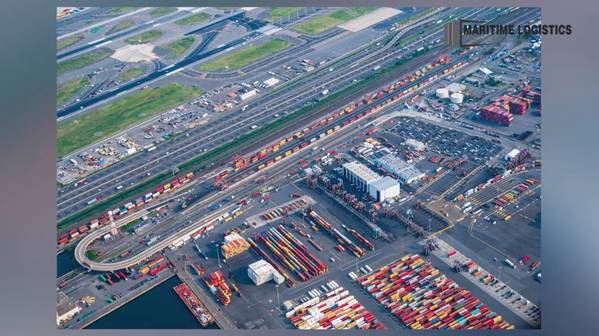
As maritime and port assets globally are pressed to reduce emissions, the search is on for the “fuel of the future” to replace diesel. But the future is now at the Port Newark Container Terminal (PNCT), which is opting to use propane-fueled equipment. Following a successful trial with a prototype propane-powered port tractor from MAFI USA, PNCT decided to move ahead with replacing its entire diesel-powered port tractor fleet and convert to propane. Charlie Ferlisi, Director of Engineering & Equipment Services, PNCT, and Sydney Eick, Director of Sales, MAFI USA, discuss the transition.
PNCT currently operates on 272 acres of land in New Jersey, operating more than 200 pieces of equipment ranging from STS gantry cranes, straddle carriers, empty handlers, reach stackers RTGs and yard tractors. “Our current throughput is approximately 1.65 million TEUs annually,” Ferlisi said. “Our main source of equipment for terminal operations is a straddle carrier, however our main source of equipment for rail operations is RTG, reach stackers and yard tractors.”
In December 2022 PNCT put the MAFI propane-fueled port tractor to the test in a side-by-side comparison with the terminal’s current diesel models, aiming to compare fuel efficiency, run time, torque, power and emissions output. The end result could not have been better for PNCT.
“From these tests, we were able to identify that there was a significant reduction in emissions using propane. It was nearly a 98% reduction in emissions compared to our Tier 3 and Tier 4 interim tractors, which was a tremendous success,” Ferlisi said. “In addition, we were able to identify that the MAFI LPG tractor had significant torque to handle our rail operation. . . without any loss of power.”
“The MAFI port tractor is powered by PSI’s 8.8-liter propane engine with an Allison gearbox a Kessler rear axle with a 90K capacity,” said Eick. The power unit is certified by the U.S. Environmental Protection Agency (EPA) and California Air Resources Board (CARB) for use in mobile, off-road applications, and emits .02 grams of NOx per brake horsepower. The engine also offers 270 hp with 565 lb.-ft. of torque. “It's 98% cleaner than diesel, environmentally friendly, affordable – especially with grant money,” Eick said. “The only thing slightly different is the pressurization of the fuel filter on the PSI engine. It's a little bit under pressure compared to a diesel, but as far as the PM's and the hourly timelines, it's all basically the same,” with no surprises regarding maintenance, with the propane not only helping with a cleaner environment, but a cleaner engine, too. “It's a PSI engine, which is the OEM located in Chicago. The longevity of the engine, the longevity of the parts is going to be extended com
pared to a diesel engine.”
According to Ferlisi, the investment in propane-fueled vehicles is part of PNCT’s ongoing efforts to improve its sustainability and reduce its carbon footprint. He said PNCT last year purchased and successfully tested hybrid diesel straddle carriers, and this year it is purchasing 20 MAFI LPG tractors. “We have a complete fleet of 45 tractors, which will be replaced within the next two years,” Ferlisi said. “The first 20 have been ordered and are expected to arrive by December of 2023. Once we have received those, we will then proceed with replacing the remaining fleet in 2024.”
“The reason why PNCT has chosen propane is for its accessibility and of course the availability within our area,” Ferlisi said. “Unfortunately, electric is still not a viable option, but electric providers are working to create the infrastructure needed to support our grid.”
Until then, PNCT is working with the Propane Education and Research Council (PERC) to identify other areas that it can improve, Ferlisi said, noting that research and development is currently underway to find a propane hybrid solution for PNCT’s straddle carriers and RTGs.




